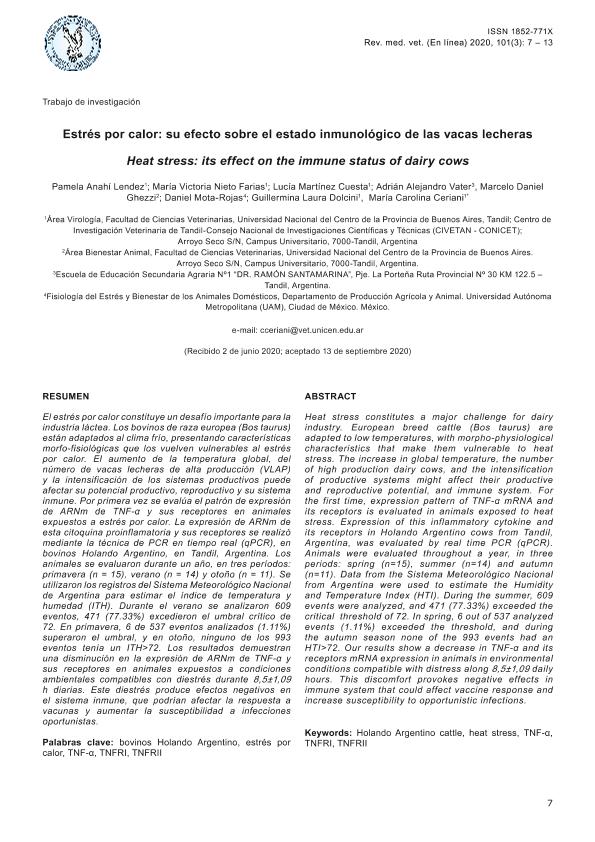Artículo
El estrés por calor constituye un desafío importante para la industria láctea. Los bovinos de raza europea (Bos taurus) están adaptados al clima frío, presentando características morfo-fisiológicas que los vuelven vulnerables al estrés por calor. El aumento de la temperatura global, del número de vacas lecheras de alta producción (VLAP) y la intensificación de los sistemas productivos puede afectar su potencial productivo, reproductivo y su sistema inmune. Por primera vez se evalúa el patrón de expresión de ARNm de TNF-α y sus receptores en animales expuestos a estrés por calor. La expresión de ARNm de esta citoquina proinflamatoria y sus receptores se realizó mediante la técnica de PCR en tiempo real (qPCR), en bovinos Holando Argentino, en Tandil, Argentina. Los animales se evaluaron durante un año, en tres períodos: primavera (n = 15), verano (n = 14) y otoño (n = 11). Se utilizaron los registros del Sistema Meteorológico Nacional de Argentina para estimar el índice de temperatura y humedad (ITH). Durante el verano se analizaron 609 eventos, 471 (77.33%) excedieron el umbral crítico de 72. En primavera, 6 de 537 eventos analizados (1.11%) superaron el umbral, y en otoño, ninguno de los 993 eventos tenía un ITH>72. Los resultados demuestran una disminución en la expresión de ARNm de TNF-α y sus receptores en animales expuestos a condiciones ambientales compatibles con diestrés durante 8,5±1,09 h diarias. Este diestrés produce efectos negativos en el sistema inmune, que podrían afectar la respuesta a vacunas y aumentar la susceptibilidad a infecciones oportunistas. Heat stress constitutes a major challenge for dairyindustry. European breed cattle (Bos taurus) areadapted to low temperatures, with morpho-physiological characteristics that make them vulnerable to heatstress. The increase in global temperature, the numberof high production dairy cows, and the intensificationof productive systems might affect their productiveand reproductive potential, and immune system. Forthe first time, expression pattern of TNF-α mRNA andits receptors is evaluated in animals exposed to heatstress. Expression of this inflammatory cytokine andits receptors in Holando Argentino cows from Tandil,Argentina, was evaluated by real time PCR (qPCR).Animals were evaluated throughout a year, in threeperiods: spring (n=15), summer (n=14) and autumn(n=11). Data from the Sistema Meteorológico Nacionalfrom Argentina were used to estimate the Humidityand Temperature Index (HTI). During the summer, 609events were analyzed, and 471 (77.33%) exceeded thecritical threshold of 72. In spring, 6 out of 537 analyzedevents (1.11%) exceeded the threshold, and duringthe autumn season none of the 993 events had anHTI>72. Our results show a decrease in TNF-α and itsreceptors mRNA expression in animals in environmentalconditions compatible with distress along 8,5±1,09 dailyhours. This discomfort provokes negative effects inimmune system that could affect vaccine response andincrease susceptibility to opportunistic infections.
Estrés por calor: su efecto sobre el estado inmunológico de las vacas lecheras
Título:
Heat stress: its effect on the immune status of dairy cows
Lendez, Pamela Anahí ; Nieto Farías, María Victoria
; Nieto Farías, María Victoria ; Martinez Cuesta, Lucia
; Martinez Cuesta, Lucia ; Vater, Adrian Alejandro; Ghezzi, Marcelo Daniel; Mota Rojas, Daniel; Dolcini, Guillermina Laura
; Vater, Adrian Alejandro; Ghezzi, Marcelo Daniel; Mota Rojas, Daniel; Dolcini, Guillermina Laura ; Ceriani, Maria Carolina
; Ceriani, Maria Carolina
 ; Nieto Farías, María Victoria
; Nieto Farías, María Victoria ; Martinez Cuesta, Lucia
; Martinez Cuesta, Lucia ; Vater, Adrian Alejandro; Ghezzi, Marcelo Daniel; Mota Rojas, Daniel; Dolcini, Guillermina Laura
; Vater, Adrian Alejandro; Ghezzi, Marcelo Daniel; Mota Rojas, Daniel; Dolcini, Guillermina Laura ; Ceriani, Maria Carolina
; Ceriani, Maria Carolina
Fecha de publicación:
09/2020
Editorial:
Sociedad de Medicina Veterinaria
Revista:
Revista de Medicina Veterinaria
ISSN:
1852-771X
Idioma:
Español
Tipo de recurso:
Artículo publicado
Clasificación temática:
Resumen
Archivos asociados
Licencia
Identificadores
Colecciones
Articulos(CIVETAN)
Articulos de CENTRO DE INVESTIGACION VETERINARIA DE TANDIL
Articulos de CENTRO DE INVESTIGACION VETERINARIA DE TANDIL
Citación
Lendez, Pamela Anahí; Nieto Farías, María Victoria; Martinez Cuesta, Lucia; Vater, Adrian Alejandro; Ghezzi, Marcelo Daniel; et al.; Estrés por calor: su efecto sobre el estado inmunológico de las vacas lecheras; Sociedad de Medicina Veterinaria; Revista de Medicina Veterinaria; 101; 3; 9-2020; 7-13
Compartir



